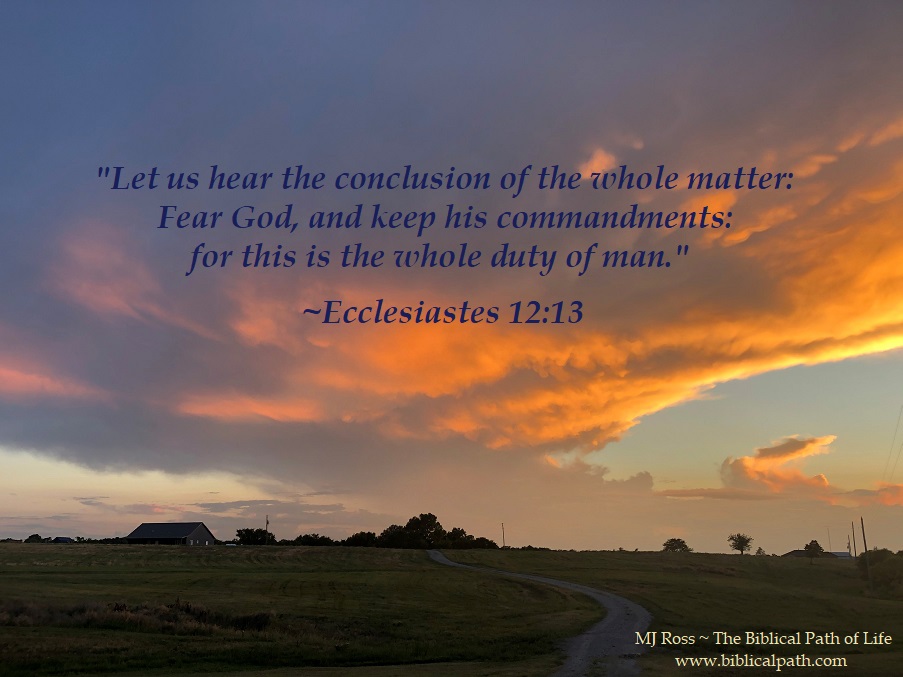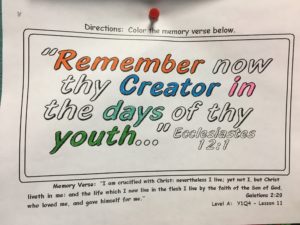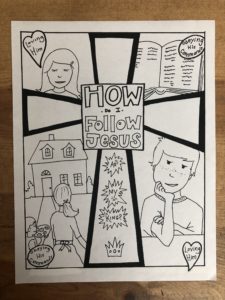
Ecclesiastes 12:13
Can you name any of God’s commandments? Without knowing what God’s commandments are, people would never understand they have sinned. “Therefore by the deeds of the law there shall no flesh be justified in his sight: for by the law is the knowledge of sin” (Romans 3:20). One must first recognize that they are sinners. That comes by knowing what God’s Law says, for God’s Law reveals sin. “For the wages of sin is death; but the gift of God is eternal life through Jesus Christ our Lord” (Romans 6:23). The penalty for breaking God’s Law is death. What do you do with that information? One should understand that Jesus came to die on the cross to take away that sin. He then offered eternal life for anyone who would receive it.
However, it takes faith to accept that gift of God’s grace. “For by grace are ye saved through faith; and that not of yourselves: it is the gift of God” (Ephesians 2:8). That guarantees that anyone who asks in faith can receive. “For whosoever shall call upon the name of the Lord shall be saved” (Romans 10:13). That person is then called a Christian. What happens for those who trust in Jesus? “For sin shall not have dominion over you: for ye are not under the law, but under grace” (Romans 6:14). Understand that when Jesus died on the cross, we were set free from sin; Christians no longer live under the Law. “What shall we say then? Is the law sin? God forbid. Nay, I had not known sin, but by the law: for I had not known lust, except the law had said, Thou shalt not covet” (Romans 7:7). God’s Law is still important. That Law was given to keep man in constant awareness of how far he had fallen short of God’s glory and the terrible price that had to be paid to bring man back into right standing with his Creator (Jesus’ death on the cross). God’s Commandments also remind us that God is perfect and righteous, and we are a people with the propensity to sin.
Christians are to live as if they belong to God. We should “hold fast the profession of our faith without wavering” (Hebrews 10:23). Christians can now claim new lives, so we must then live new lives. “Therefore if any man be in Christ, he is a new creature: old things are passed away; behold, all things are become new” (2 Corinthians 5:17). Christians are now able to live new lives of obedience to God and His commands.
God then does something special for those who belong to Him.
God has now written His Law on the Christian’s heart and mind. “This is the covenant that I will make with them after those days, saith the Lord, I will put my laws into their hearts, and in their minds will I write them” (Hebrews 10:16). His Spirit lives inside each Christian, constantly reminding him or her of God’s will. “For they that are after the flesh do mind the things of the flesh; but they that are after the Spirit the things of the Spirit” (Romans 8:5). We are then able to please God in the following of His Law that is written in our hearts. This is because we have been encouraged to do the following: “Thy word have I hid in mine heart, that I might not sin against thee” (Psalm 119:11). We must hide God’s Word in our hearts so we will not sin against God but live for Him.
“Let us hear the conclusion of the whole matter: Fear God, and keep his commandments: for this is the whole duty of man” (Ecclesiastes 12:13). Understand that fearing God does not mean being afraid of Him. Fear means “morally to revere; a dread of His wrath; and a reverence of His majesty.” It is knowing what God expects of Christians and then doing it.
Do you read God’s Word daily, hiding it in your heart so you can live a life pleasing to Him?

